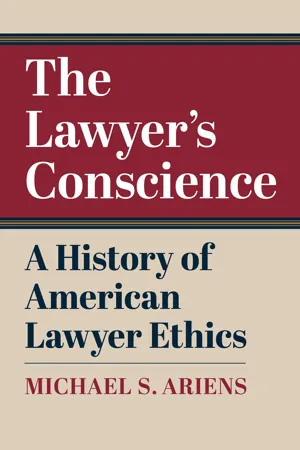
- 408 pages
- English
- ePUB (mobile friendly)
- Available on iOS & Android
About this book
In 1776, Thomas Paine declared the end of royal rule in the United States. Instead, “law is king,” for the people rule themselves. Paine’s declaration is the dominant American understanding of how political power is exercised. In making law king, American lawyers became integral to the exercise of political power, so integral to law that legal ethics philosopher David Luban concluded, “lawyers are the law.”
American lawyers have defended the exercise of this power from the Revolution to the present by arguing their work is channeled by the profession’s standards of ethical behavior. Those standards demand that lawyers serve the public interest and the interests of their paying clients before themselves. The duties owed both to the public and to clients meant lawyers were in the marketplace selling their services, but not of the marketplace.
This is the story of power and the limits of ethical constraints to ensure such power is properly wielded. The Lawyer’s Conscience is the first book examining the history of American lawyer ethics, ranging from the mid-eighteenth century to the “professionalism” crisis facing lawyers today.
Frequently asked questions
- Essential is ideal for learners and professionals who enjoy exploring a wide range of subjects. Access the Essential Library with 800,000+ trusted titles and best-sellers across business, personal growth, and the humanities. Includes unlimited reading time and Standard Read Aloud voice.
- Complete: Perfect for advanced learners and researchers needing full, unrestricted access. Unlock 1.4M+ books across hundreds of subjects, including academic and specialized titles. The Complete Plan also includes advanced features like Premium Read Aloud and Research Assistant.
Please note we cannot support devices running on iOS 13 and Android 7 or earlier. Learn more about using the app.
Information
Table of contents
- Front Cover
- Half Title
- Title Page
- Copyright Page
- Table of Contents
- Dedication
- Acknowledgments
- Introduction
- 1. Origins, 1760–1830
- 2. Honor and Conscience, 1830–1860
- 3. Clients, Zeal, and Conscience, 1868–1905
- 4. Legal Ethics, Legal Elites, and the Business of Law, 1905–1945
- 5. Prosperity, Professionalism, and Prejudice, 1945–1969
- 6. Beginning and Ending, 1970–1983
- 7. The Professionalism Crisis and Legal Ethics in a Time of Rapid Change, 1983–2015
- Conclusion
- Notes
- Index
- Back Cover